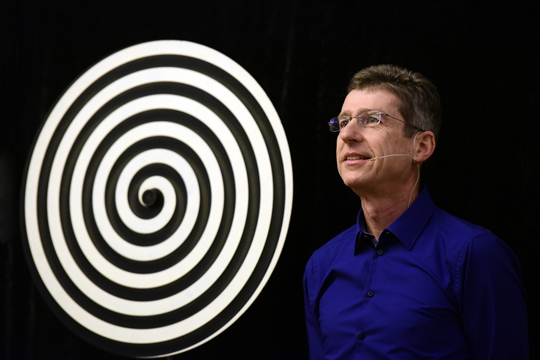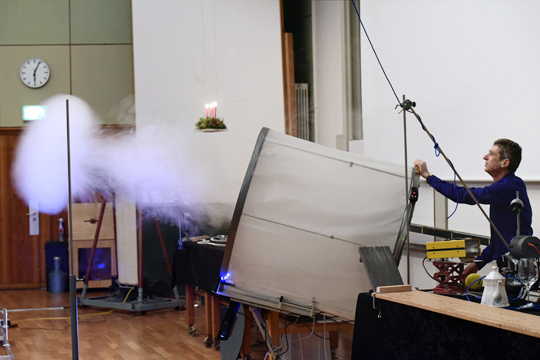Experiment after Experiment
Freiburg, Oct 25, 2019
Is physics a book with seven seals? Not for Prof. Dr. Horst Fischer. His "Christmas Lectures" ("Weihnachtsvorlesungen") always fill every seat in the auditorium. Beyond imparting knowledge, his presentations have an entertainment value, too. They include astounding experiments that demonstrate to everyone and anyone that physics can be a real blast. Fischer's students profit from his experiment-oriented teaching methods as well. In 2019, the University of Freiburg presented the 60-year-old with the University Teaching Award. He spoke with Anita Rüffer about the art of presenting complex relationships.

Horst Fischer has hit the bull's eye with is experiment-oriented teaching methods. And for that, the University of Freiburg recently honored him with the University Teaching Award. Photo: Thomas Kunz
Mr. Fischer, you've just come back from a vacation in Greece. Was physics along for the whole trip?
Horst Fischer: When I'm on vacation I practice what I teach my students during their education. Don't accept anything as a given and examine the physical relationships involved in everyday phenomena.
Was physics your favorite subject in school?
That question's out of context with my background. After finishing secondary school, I trained as a telecommunications engineer. That sparked my interest in studying physics. So I had to catch up and qualify for university by getting a diploma known as an "abitur.”
So you didn't get into physics by studying theory?
I'm still profiting today from the good training – with an emphasis on practical work – I received from the postal service back then.
And the audience for your "Christmas Lectures" benefits from it as well. What's made these lectures into cultural happenings?
I try to lure people out of their comfort zone. Something happens that's very different from what they expected, because their perceptions or ideas of it are incorrect. That produces an "ah-ha"effect.
What could one of these false perceptions be?
Many have watched on television how rockets lift off into space from Cape Canaveral. They imagine that the rocket goes up as if it were on a trampoline, emitting a burst of flame that thrusts it away from the earth.
But isn't that what it does?
During the lecture, I do an experiment with a water bottle, a cork, and liquid nitrogen. The bottle whizzes around the auditorium like a rocket. If it's heated, the nitrogen vaporizes and increases its volume by thousands of times. That's a thermodynamic effect. The pressure pops the cork out of the bottle and the bottle itself shoots off in the opposite direction.

Fire and brimstone: Horst Fischer performs an experiment in a "Christmas Lecture.” Photo: Thomas Kunz
You can even get an "car" moving like that, right?
In order to consolidate what's been learned, our workshop has built a car with a similar water bottle mounted beneath it. When the gas flows out of the bottle, the car goes off in the opposite direction with me in it. There isn't ground there, or a wall to push off. Instead, it's just the physical law of conservation of momentum. Once you've seen that, you'll never forget it.
Are your lectures for students like the Christmas Lectures?
Even in my introductory lectures for physics and medical students, I like use every day experiences to teach the laws of physics. But the laws also have to be mathematically deduced and the experiments evaluated.
Physics is said mainly to be a man's world. Is there a special gene that makes people passionate about physics?
Physics can be taught to anyone, regardless of gender. It's a question of socialization. Now, around a quarter of the students are women. When I started teaching in the 1980s, it was only three percent.
Do you feel a sense of mission to bring more validity to your subject?
I wouldn't call it a mission. I achieve a type of inner satisfaction when I can teach people that physics is fun. It's not nearly as complicated as everyone thinks. Physics is applicable to everything. Physicists work in banks, or industrial companies, on executive boards, or in development departments. They have learned to break down complex processes into small problems that then become solvable.
That's why you're in demand everywhere, especially urgently in the schools.
But then you can't make it too difficult. Cultural administration and accident insurance create cumbersome bureaucracies in that they require a detailed risk assessment for each experiment. Sources of radioactivity have been almost completely ruled out, no matter how much radiation they emit. Quantum physics can only be taught theoretically. Anyone teaching physics needs time and good equipment for experiments. Referring people to "The Show with the Mouse"("Sendung mit der Maus") or Youtube is not an adequate substitute and it doesn't motivate the teachers, either. We offer student teachers a practical course for school laboratories including demonstration experiments. But the dilemma is often that they can't be applied in daily school instruction.

